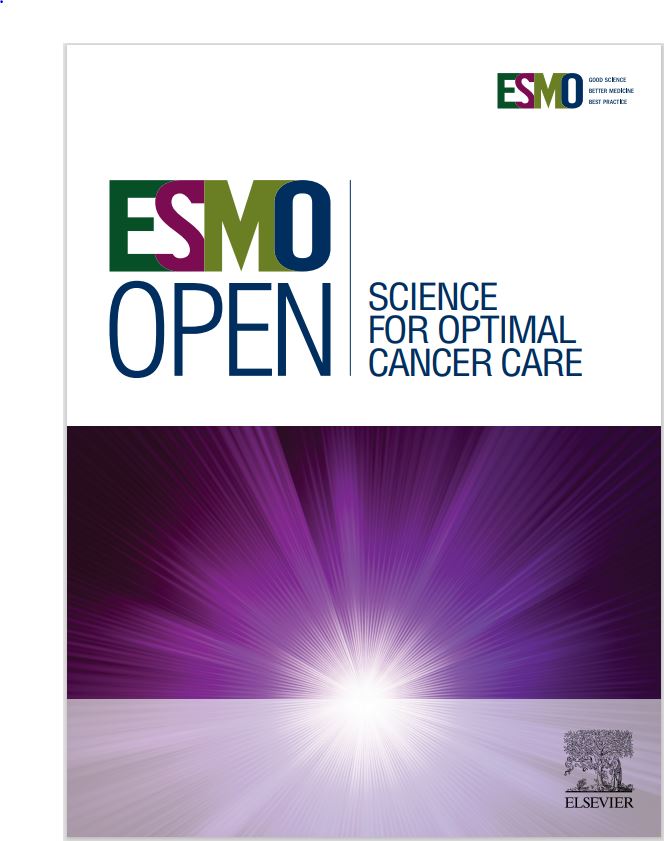Practical treatment strategies and novel therapies in the phosphoinositide 3-kinase (PI3K)/protein kinase B (AKT)/mammalian target of rapamycin (mTOR) pathway in hormone receptor-positive/human epidermal growth factor receptor 2 (HER2)-negative (HR+/HER2−) advanced breast cancer
IF 7.1
2区 医学
Q1 ONCOLOGY
引用次数: 0
Abstract
Mutations in the phosphoinositide 3-kinase (PI3K)/protein kinase B (AKT)/mammalian target of rapamycin (mTOR) pathway occur in 30%-40% of patients with advanced hormone receptor-positive/human epidermal growth factor receptor 2 (HER2)-negative (HR+/HER2−) breast cancer. For most patients, endocrine therapy with a cyclin-dependent kinase 4/6 (CDK4/6) inhibitor is the first-line treatment. Recent studies indicate that adding inavolisib, a PI3Kα inhibitor, to palbociclib/fulvestrant benefits patients with endocrine-resistant HR+/HER2− metastatic breast cancer with a PIK3CA mutation. Alpelisib and capivasertib are both US Food and Drug Administration (FDA) approved in combination with fulvestrant in patients with endocrine-resistant HR+/HER2−, PIK3CA-mutant metastatic breast cancer, both with activity in the post-CDK4/6 setting. Capivasertib added to fulvestrant is the first AKT inhibitor to show a significant progression-free survival benefit with a trend for overall survival benefit and the only approved option for patients with phosphate and tensin homolog (PTEN) or AKT alterations. Toxicity profiles of all agents necessitate careful patient selection. Several mutant-selective and pan-mutant-selective novel inhibitors are under investigation with the potential to improve tolerability and efficacy.
激素受体阳性/人表皮生长因子受体 2(HER2)阴性(HR+/HER2-)晚期乳腺癌中磷酸肌酸 3- 激酶(PI3K)/蛋白激酶 B(AKT)/哺乳动物雷帕霉素靶标(mTOR)通路的实用治疗策略和新型疗法。
30%-40%的晚期激素受体阳性/人表皮生长因子受体2(HER2)阴性(HR+/HER2-)乳腺癌患者会发生磷酸肌酸3-激酶(PI3K)/蛋白激酶B(AKT)/哺乳动物雷帕霉素靶标(mTOR)通路的突变。对于大多数患者来说,内分泌治疗与细胞周期蛋白依赖性激酶4/6(CDK4/6)抑制剂是一线治疗方法。最近的研究表明,在palbociclib/fulvestrant的基础上添加inavolisib(一种PI3Kα抑制剂)可使PIK3CA突变的内分泌耐药HR+/HER2-转移性乳腺癌患者获益。Alpelisib和capivasertib均已获得美国食品和药物管理局(FDA)批准,可与氟维司群联合用于治疗内分泌耐药的HR+/HER2-、PIK3CA突变的转移性乳腺癌患者。Capivasertib 加入氟维司群治疗,是首个显示出显著无进展生存期获益和总生存期获益趋势的 AKT 抑制剂,也是磷酸与天丝同源蛋白(PTEN)或 AKT 改变患者唯一获批的选择。所有药物的毒性特征都要求对患者进行谨慎选择。目前正在研究几种突变选择性和泛突变选择性新型抑制剂,它们有可能改善耐受性和疗效。
本文章由计算机程序翻译,如有差异,请以英文原文为准。
求助全文
约1分钟内获得全文
求助全文
来源期刊

ESMO Open
Medicine-Oncology
CiteScore
11.70
自引率
2.70%
发文量
255
审稿时长
10 weeks
期刊介绍:
ESMO Open is the online-only, open access journal of the European Society for Medical Oncology (ESMO). It is a peer-reviewed publication dedicated to sharing high-quality medical research and educational materials from various fields of oncology. The journal specifically focuses on showcasing innovative clinical and translational cancer research.
ESMO Open aims to publish a wide range of research articles covering all aspects of oncology, including experimental studies, translational research, diagnostic advancements, and therapeutic approaches. The content of the journal includes original research articles, insightful reviews, thought-provoking editorials, and correspondence. Moreover, the journal warmly welcomes the submission of phase I trials and meta-analyses. It also showcases reviews from significant ESMO conferences and meetings, as well as publishes important position statements on behalf of ESMO.
Overall, ESMO Open offers a platform for scientists, clinicians, and researchers in the field of oncology to share their valuable insights and contribute to advancing the understanding and treatment of cancer. The journal serves as a source of up-to-date information and fosters collaboration within the oncology community.
 求助内容:
求助内容: 应助结果提醒方式:
应助结果提醒方式:


